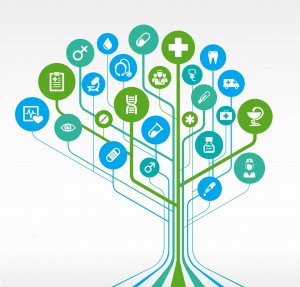The emerging field of Public Health Genomics intends to integrate genome-based knowledge and technologies into public policy and into health services. It thus is expected that human genetics will develop from a specialist medical field pertaining mainly to those small groups of patients with a risk of developing an inherited (and mainly monogenetic) disease into a significant area of mainstream medicine. Predictive testing for susceptibilities to develop common diseases (such as diabetes mellitus and cancer) e.g. is regarded as a field for Public Health Genomics.
A discussion on “Public Health Genomics” (including fields and concepts such as genetic population screening, pharmacogenetics, nutrigenetics, personalized medicine) has started in many European countries. The expansion of the reach of human genetics is promoted by some human geneticists and public health authority representatives (e.g. the Public Health Genomics Foundation). Critics argue that a public, preventive programme making use of genetics for population screening is doubtful in many cases with regard to its effectiveness, and that promotion of public health genetic programmes are premature and overestimate the current clinical relevance. Public Health Genomics may imply major but contested improvements for patients, large effects on the structure and financing of the public health system, and major ethical and privacy issues.
The possibilities for mapping people’s genetic make-up are growing rapidly, and the costs are falling all the time. For some time now, the talk has been of the ‘1000 dollar genome’, which would allow us to have ourselves fully genetically screened for a fairly modest sum of money. This would reveal positive things, but also a host of medical conditions that might lie in store for us. It is expected that broad genetic tests such as whole genome sequencing will become a normal part of healthcare in the foreseeable future, possibly as part of existing screening programmes such as the heel prick test for newborn screening.
The introduction of broad genetic testing and services will raise many ethical, social and legal questions. Questions about the predictive value of genetic information (which is sometimes very poor), about unexpected findings (if you test broadly, you might find out things you would rather not know) and about how long genetic screening procedures will continue to be based on ‘informed consent’.
Can broad genetic testing and services make a responsible contribution to public health? This is the key question being addressed by the European Future Panel on Public Health Genomics project. The aim is to help devise a European policy agenda for the future of public health genomics by instituting an interactive process between policymakers and MPs (the ‘Future Panel’) and experts, and to gain more experience with the Future Panel as a method of Technology Assessment. TA was used internationally for the first time in this project.
The Future Panel identified major policy questions relating to the future of public health genomics which were the starting point for a consultation process, bringing together experts who were asked to cover these questions in four Expert Working Group Reports focusing on different themes. On the basis of these reports an Expert Paper was produced with a focus on policy issues raised by developments in public health genomics. Finally, policy options for dealing with these issues were described in a Policy Brief that was discussed in an Policy Hearing involving the Future Panel and a variety of experts (Lisbon, 18 January 2014).
The European Future Panel on Public Health Genomics involved cooperation between:
- A Future Panel of political decision-makers
- A Steering Group of partners and actors
- Experts and/or expert work groups
The objectives were:
- To give input to policy-making on policies on Public Health Genomics, in terms of an overview of state-of-affairs and policy options
- To establish a national/regional and EU level experience with a coordinated expert-based TA method involving parliamentarians
- To cooperate with decision-makers on national/regional and EU level, in order to create experience on, and thereby mobilisation around, the use of such methods among the main users
- To cooperate with the scientific community on Public Health Genomics in order to create learning and mobilisation on the potential of expert-based policy-making facilitated by TA specialists
- To involve countries that do not have established such institutions and methods directly in the work in order to build capacity, to create learning and to mobilise the actors.




